|
|
|
Sort Order |
|
|
|
Items / Page
|
|
|
|
|
|
|
| Srl | Item |
| 1 |
ID:
177705
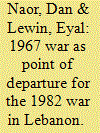

|
|
|
|
|
| Summary/Abstract |
Israel’s 1982 war in Lebanon is one of the most controversial events in its history. It is considered the war of Prime Minister Menachem Begin and his defense minister, Ariel Sharon, and hence a war of choice. One of the historical questions concerning that war revolves around its origins. The widespread assumption is that the roots can be found in 1981, the year in which Israel was on the verge of war with both Syria and the PLO. However, this article claims that the 1967 Six-Day War was the point of departure to the 1982 Lebanon War when the PLO settled in Lebanon. The issue of the origins of the 1982 war is not an exclusively historiographic matter. It has broader implications concerning the nature of the war. If the roots of the conflict can be found in 1967, then the war was a result of a prolonged process. Indeed, Israel started the war, but it was only after other options that it exercised had failed. Hence, it was not at all a war of choice.
|
|
|
|
|
|
|
|
|
|
|
|
|
|
|
|
| 2 |
ID:
185266
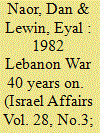

|
|
|
|
|
| Summary/Abstract |
Forty years after its occurrence, the 1982 Lebanon war remains academically understudied with the received wisdom about the conflict largely based on political and journalistic accounts. According to these accounts, the war was a political ploy by Defence Minister Ariel Sharon and Prime Minister Menachem Begin aimed at achieving far-reaching political goals rather than a defensive attempt to remove the terrorist threat to Israel’s northern areas. By placing the conflict within the context of Israeli history and the Arab-Israeli conflict, on the one hand, and the nature and characteristics of modern warfare, on the other, this article offers a more nuanced interpretation of the Lebanon War, showing that it was not fundamentally different from past military encounters.
|
|
|
|
|
|
|
|
|
|
|
|
|
|
|
|
| 3 |
ID:
137551
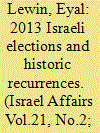

|
|
|
|
|
| Summary/Abstract |
The 2013 election campaign in Israel shows, at first glance, some unanticipated results and unexpected reactions of several political actors. Three events in particular can be noted: (1) the rise of a significant centrist middle-class party; (2) the association of the newly elected right-wing Prime Minister with his left-wing rivals; and (3) the revival of a national religious party after years of decline. A broad overview, however, reveals that from many perspectives numerous key elements of Israeli politics have remained broadly the same over the decades. Some unanticipated outcomes of the elections are to a substantial extent repetitions of past events, referred to in this paper as historic recurrences. In order to establish this claim about historic recurrence, each event is compared to past events with which several striking similarities are found. In order to explain the phenomenon of historic recurrence in Israeli politics, two sets of concepts are applied: the sociological terminology regarding reference group and collective identity, and rational choice theories about voter behaviour and the preferences of political actors.
|
|
|
|
|
|
|
|
|
|
|
|
|
|
|
|
| 4 |
ID:
127336
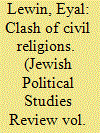

|
|
|
|
|
| Publication |
2013.
|
| Summary/Abstract |
Almost thirty-five years after Camp David and twenty years after the Oslo Accord, a fundamental question remains unanswered: does the majority of the Israeli public support a left-wing or right-wing ideology? The answer, in a democratic system, should be obvious, since elections are supposed to give a clear picture of the political preferences of the voting public. However, Israeli polls are misleading. After the Yom Kippur disaster in 1977, Menachem Begin won his premiership running as the hawkish leader who never would surrender even one grain of sand from the Land of Israel. Yet after he personally gave up the entire Sinai Peninsula his party won an even greater majority in 1981.1 Yitzhak Rabin won his premiership in 1992 representing the hawkish section of the Labor party with declarations that he would never negotiate with the PLO;2 yet it seems that signing the Oslo Accords led him, rather, to the peak of his popularit.
|
|
|
|
|
|
|
|
|
|
|
|
|
|
|
|
| 5 |
ID:
146855


|
|
|
|
|
| Contents |
While nearly half of the Israeli public opposed the idea of withdrawal from Gaza and parts of Northern Samaria, the implementation of the disengagement plan met with a minimum of resistance. The reasons for the above may be found by examining the ideological background of two schools of modern Zionist thought: the imperative of clinging to the land, that is, the Land of Israel, versus the acceptance of geographically unspecific territorialist ideas. Despite the fact that clinging to the Land of Israel has deep roots in the country’s national ethos, many Zionist thinkers espoused the principles of territorialism, which ultimately prevailed among the decision-makers who planned and carried out the disengagement.
|
|
|
|
|
|
|
|
|
|
|
|
|
|
|
|
| 6 |
ID:
144674
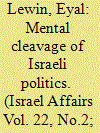

|
|
|
|
|
| Summary/Abstract |
In societies marked by numerous diversities, like the Jewish-Israeli one, understanding social cleavages might show a larger picture of the group and form a broader comprehension of its characteristics. Most studies concentrate on somewhat conventional cleavages, such as the socioeconomic cleavage, the ethnic cleavage, the religious or the political one; this article, by contrast, suggests a different point of view for the mapping of social cleavages within Israeli society. It claims that the Jewish population in Israel is split into two competing groups: stakeholders versus deprived. These categories of social identity are psychological states of mind in which no matter how the national resources are distributed, the stakeholders will always act as superiors, even if they are in inferior positions, while the deprived will always take the role of eternal underdog even if all of the major political ranks come under their control. This article brings about a review of over a century of ideological debates within the Zionist movement; it reveals how understanding the logic of the Israeli political discourse as a competition between the two newly defined social groups enables a better comprehension of the inherent tension between them.
|
|
|
|
|
|
|
|
|
|
|
|
|
|
|
|
| 7 |
ID:
174832
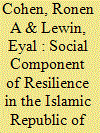

|
|
|
|
|
| Summary/Abstract |
This article examines the social components of national resilience as the source of the Islamic Republic of Iran’s ability to cope with possibly lethal blows and economic setbacks through four stages: (I) an account of the 1980–1988 Iran–Iraq War and the surprising outcome that left Iran undefeated, (II) a review of several theories that can aid us to analyze Iran’s national resilience ability, (III) an analysis of Iran’s wartime survival using the abovementioned theoretical infrastructure, (IV) a concise review of current issues in Iranian society which concludes with an evaluation of the state of Iran’s resilience regarding attacks on their nuclear program and its ramifications.
|
|
|
|
|
|
|
|
|
|
|
|
|
|
|
|
| 8 |
ID:
191899
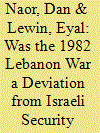

|
|
|
|
|
| Summary/Abstract |
On June 6, 1982, Israel invaded Lebanon with the aim of destroying the military infrastructure of the Palestine Liberation Organization (PLO), which was serving as a launching pad for terrorist infiltrations and Katyusha attacks into northern Israel. From its outset, the Israeli public considered the war an exceptional case and a deviation from the “proper” course of Israeli history. Allegedly, unlike other Israeli wars, the 1982 War did not relate to Israeli security concerns but instead to the political aims and whims of Menachem Begin and Ariel Sharon. Also, it is often described as an unjust war of choice, which Israel initiated while it was not facing an existential threat. The claim that the 1982 Lebanon War was exceptional and a deviation from original Israeli principles is the main interest of this article. To determine whether the Lebanon War was a breach of Israeli history or a deviation from Israeli foundational political-moral principles, one must analyze the core tenets of Israel’s security strategy to which it adhered in most of its battles. Using the security doctrine as a guide map reveals that the conflict was neither unique nor a deviation but rather a fulfillment of long-standing Israeli security principles.
|
|
|
|
|
|
|
|
|
|
|
|
|
|
|
|
|
|
|
|
|